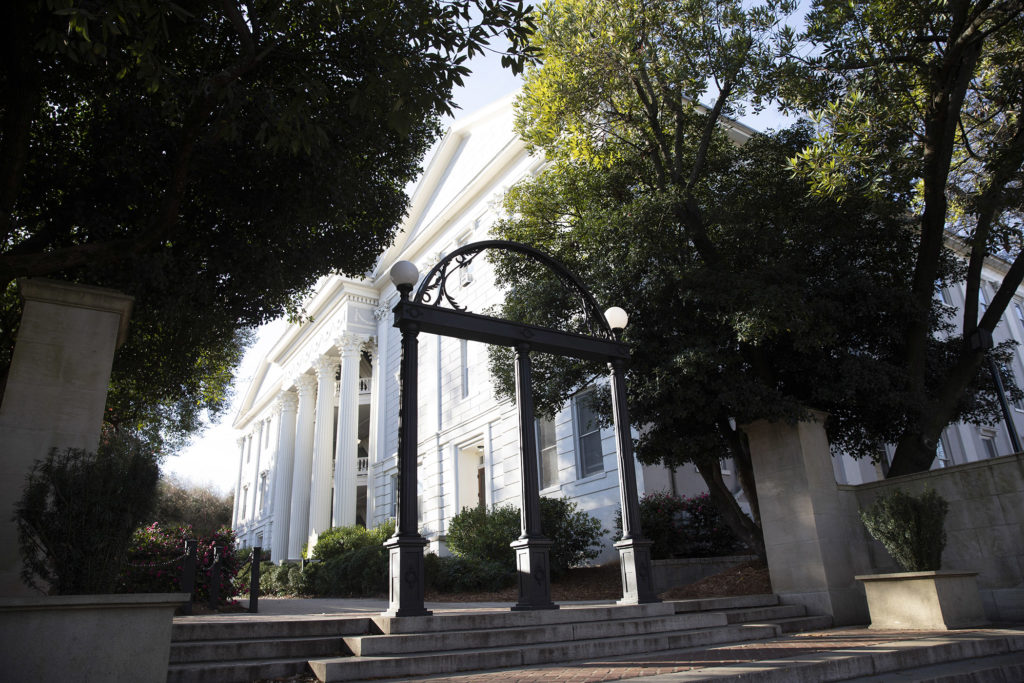Last July, a plan to create a better, stronger University of Georgia was outlined. This plan included four initiatives to foster a more diverse and inclusive community at UGA:
- Presidential Task Force on Race, Ethnicity, and Community
- UGA Planning Committee on Diversity and Inclusive Excellence
- 60th Anniversary of Desegregation at UGA
- Community Conversations
On Monday, Jan. 11, President Jere W. Morehead provided an update to the campus community on the initiatives.
“The work of creating a welcoming and inclusive campus is one that we all share,” said Morehead. “As we continue on this important journey, I am excited about the opportunities that lie ahead for our institution: the opportunity to learn and grow as a community, to better understand each other, and to build a strong learning environment where everyone feels a sense of belonging. Our work in this area is far from over, but I want to assure all of you that we are making progress.”
Presidential Task Force on Race, Ethnicity, and Community
The Presidential Task Force on Race, Ethnicity, and Community was established to examine issues related to race, ethnicity and community and to develop concrete recommendations that can be implemented during the coming academic year to continue to improve campus culture and strengthen the learning environment. Morehead committed $1 million of private resources from the UGA Athletic Association to support recommendations by the task force. The task force has successfully completed its work, and several of its recommendations are already being implemented. Those include:
- Judge Horace J. Johnson, Jr. Lecture Series
- New Diversity Educator Position
- National Panhellenic Council Recognition Markers
- Diversity, Equity, and Inclusion Student Advisory Board
- Voices of Color Dialogue Series
- Reflective Structured Dialogue Training Program
- Community Read Project
- Public Art Project
More information about these initiatives can be found on the task force website.
UGA Planning Committee on Diversity and Inclusive Excellence
The Diversity and Inclusive Excellence Planning Committee has also made significant progress since it was charged by Morehead on Aug. 14. The committee has organized its work around three inclusive excellence priorities:
- Building an inclusive living and learning environment for diverse student access and success;
- Recruiting and retaining a diverse University workforce to advance our mission in the 21st century; and
- Expanding partnerships and outreach to strengthen diverse communities.
Grounded in the university’s mission and UGA’s 2025 Strategic Plan, these priorities represent broad areas under which the committee will develop more specific five-year, university-level goals to promote diversity and inclusion.
The committee has initiated a three-phase process to complete its plan by fall 2021. The discovery phase, which wrapped up in December, included conducting more than 40 focus groups with numerous faculty, staff, student, alumni and community stakeholders. The committee is now identifying major themes across its data collection efforts to guide the next phase of its work—goal development—which will span much of the spring semester. The final phase will take place over the summer and will focus on plan implementation among schools, colleges and major administrative units.
More information about the planning process can be found on the diversity plan webpage.
60th Anniversary of Desegregation at UGA
The 60th Anniversary of Desegregation kicked off on Jan. 9—the date in 1961 when Hamilton Holmes and Charlayne Hunter enrolled at the University of Georgia—with a special bell-ringing commemoration at the Chapel that featured several prominent Black alumni. You can view a video about the 60th anniversary and visit the Main Library to view the new display honoring Georgia trailblazers. The celebration will continue with events planned throughout the semester. A calendar has been established that highlights all of these events. Learn more about this historic moment and many of those involved on the website that has been created for the celebration.
Community Conversations
Another key part of the plan was to engage the campus in thoughtful dialogue about race and racism. The Fanning Institute, a regional leader in facilitation, led these conversations for the campus community. The discussions presented an opportunity for individuals to share their experiences with racism and explore how each individual and their affiliated organizations can promote positive change and unity at UGA. In an effort to expand conversations like these, Morehead has provided funding for individuals across campus to receive training in Reflective Structured Dialogue. RSD enables people to have difficult conversations on polarizing issues by creating a foundation of trust, resiliency, and collaborative action. Expanding this training will help the university community effectively navigate challenging topics.
